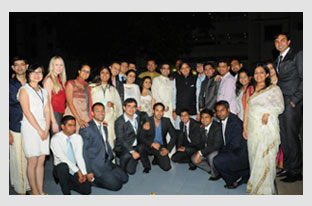ISB Hosts the 30th Graduate Business Conference

The recently concluded 30th Graduate Business Conference at the ISB was attended by student leaders from 37 prominent business schools across 15 countries, who interacted with their hosts over five days of speaker sessions, workshops, cultural events and informal networking sessions. This annual conference is sponsored by the Graduate Business Forum (GBF), a global network of current and former student leaders from the world’s top graduate business programmes. This is the first time that the conference was held in India.
“Leadership in a New Age,” was an apt theme as prominent speakers such as Harish Manwani, Devdutt Pattanaik and Shashi Tharoor shared their perspectives on this topic. In Manwani’s opening address on “Leadership in the New Age,” he asserted that in addition to the 3Gs of growth – consistent growth, competitive growth and profitable growth, a fourth G, “responsible growth” is essential for creating leadership in the future. While Manwani spoke about the future Mythologist Pattanaik returned to his roots as he spoke about “factoring culture into leadership in the global village.” Decoding myths from around the world, he discussed how people’s beliefs are based on the myths and stories that they have grown up with in their cultures. Leaders will be better served if they understood people by learning about their beliefs, he proposed. Noted author and Minister of state for Human Resource Development, Shashi Tharoor, concurred with Pattanaik on how leaders in the new age must strive to “understand that people don’t just speak other languages but that they also think differently, that they understand things differently even when you(they) can speak a language in common.” Speaking about the challenges that leaders must deal with in the new age, Tharoor felt that globalisation was one such challenge, a double-edged sword that on the one hand “integrates people, businesses, non-governmental organisations and nations into larger networks” while on the other it produces “economic and social dislocations.”
Students responded to the speeches and discussions with much enthusiasm. For many it was their first time experiencing India and their hosts ensured that the visitors returned to their schools with great memories.
Graduation Day
April 6, 2013 at Mohali
April 7, 2013 at Hyderabad
Orientation Week
April 14-21, 2013